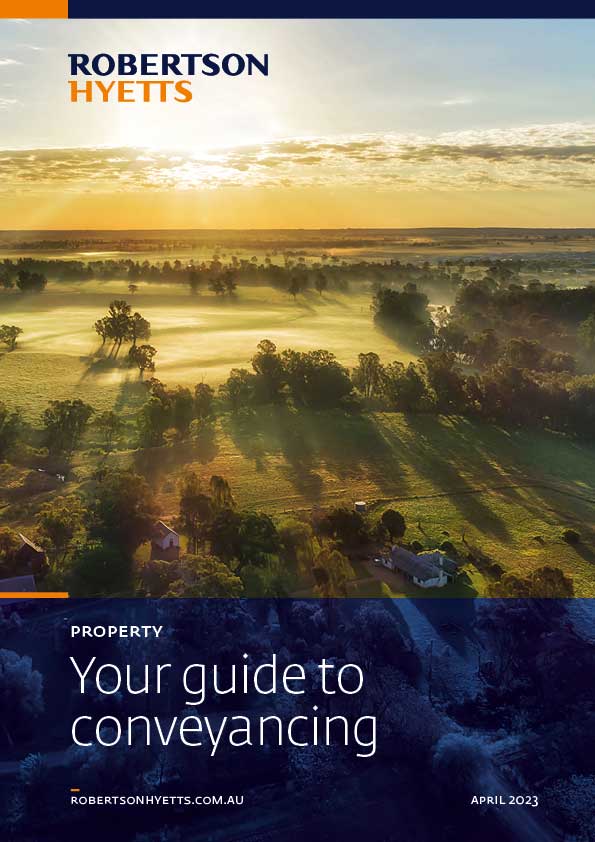Our experienced team of local Bendigo and Castlemaine based conveyancers and property lawyers make the transfer of a property a smooth process and importantly, legally compliant.
Navigating the legal maze of property transactions can be a daunting task, especially if you’re not versed in the nuances of property law. That’s where we come in.
At Robertson Hyetts Lawyers, we’ve been serving Bendigo and Central Victoria for over 140 years, offering insightful counsel backed by personalised attention. Our approach is simple: we get you, so we can get it done for you.
What sets us apart
Choosing a firm to help with property transfer often boils down to price, leaving the unique value-add of lawyers and conveyancers unexplored. We pride ourselves on going beyond. Our seasoned lawyers have intricate knowledge of property law to ensure your interests are always front and centre.
Purchaser special conditions guidelines
The building inspection and pest inspection conditions in the LIV Contract of Sale only allow a purchaser to pull out of the contract in a very narrow circumstances.
This free guide from Robertson Hyetts outlines some special conditions that better protects a purchaser’s interests.
Just fill in your details below to be sent your obligation free guidelines.

"*" indicates required fields
Buying or selling a property
Decoding the Contract of Sale
Whether you’re buying or selling, a Contract of Sale is your foundational document. Our experts draft this contract to include all vital elements:
- Contact Information: Your details and those of your agent
Contact Information: Your details and those of your agent
Property Address & Price: The where and how much
Fixtures and Fittings: What stays and what goes
Legal Requirements: Easements, payment terms, and a cooling-off period
Our aim is to make selling not just easy but also safe. We walk you through each step—planning, title searches, and special conditions—to make the process hassle-free.
Your guide to conveyancing
While conveyancing may seem straightforward, like all aspects of the law, it can be complicated and costly if not done correctly.
This free guide from Robertson Hyetts will help you understand who is responsible for what, to help make your experience as stress free as possible.
Fill in your details below, and we’ll send you an obligation free guide.

"*" indicates required fields
Subdividing land
Thinking of subdividing your property? You’ll need approval, and each council has its own set of rules. Our conveyancers help you gauge the cost and guide you through the legal prerequisites like zoning, drainage, and property boundaries. From drafting documents to liaising with authorities, we’ve got it all covered.
Before you make an application, your first step is to engage a licensed surveyor to develop a plan of subdivision. In Victoria you need to apply for a planning permit for development with subdivision via SPEAR. On the SPEAR site you can get information on residential subdivisions, building envelopes, bushfire management overlays and planning practice notes.
Our conveyancers can help you determine the considerations of subdividing your land such as zoning, property boundaries, drainage, easements and covenants and other restrictions. We draft all the documentation you need and lodge your plans with the right authorities.
Updating a Certificate of Title
Got a change in ownership or address? No worries. Wherever you are in Victoria, we handle the complex paperwork to update or change your Certificate of Title.
Understanding adverse possession
In Victoria, it is possible to acquire title to land by way of an adverse possession claim. To successfully make an adverse possession claim you will need to be able to prove that you (including any previous owners) have had uninterrupted and exclusive possession of the land for a minimum period of 15 years without objection from the actual landowner.
Adverse possession claims commonly arise when fence lines do not align with title boundaries or land adjacent to a property is used without the true owner’s objection. Adverse possession applications require meticulous attention to detail.
Adverse possession applications
Preparing an adverse possession application can be complex and the assistance of a lawyer is advisable. Adverse possession applications are made to Land Use Victoria. We can assist in preparing and providing all the necessary documentation:
- Evidence of occupancy for the statutory period
- Professional survey maps and photographs
- Statutory declarations from you as the applicant and a disinterested witness who swears to the facts of your occupation of the land
- A letter from the council providing evidence of the individuals recorded as the rated owners over the last 15 years
- Land registry searches
We are skilled in preparing adverse possession applications and assisting you with collecting and preparing the appropriate evidence, including introducing you to estate agents and surveyors with the necessary experience and expertise, to ensure your adverse possession claim is a success.
General law conversion
Own a land that’s been around since before 1862? It’s mandatory to convert from General Law to a Torrens title. Our property lawyers make this transition smooth, ensuring you have a government-guaranteed title.
Registering, changing or removing an easement
Whether you’re registering a new easement or removing an outdated one, we manage all the intricate legal documentation for you. Need more information on easements? Click here.
Making conveyancing simple
At Robertson Hyetts, we’re passionate about demystifying the complexities of conveyancing. Our approachable yet authoritative staff provide clear explanations, aimed at making your property transfer a breeze.
Looking for a conveyancing lawyer in Bendigo, or perhaps more information on conveyancing in Victoria? Reach out to us and experience the Robertson Hyetts difference.
Conveyancing FAQs
The Sale of Land Amendment Act 2019 came into effect on 1 March 2020. This Act provides that a person must not knowingly conceal from a prospective purchaser any material facts about a property being sold.
A material fact is one which would be important to a purchaser in considering whether to purchase a property and which would ultimately influence that decision and the price they would pay.
A fact would be a ‘material fact’ if the fact results in the property being rare or unusual, or if knowledge of the fact would impact a potential purchaser’s willingness to purchase the property. A fact may also be considered material if it is of particular significance to a purchaser such that the purchaser had specifically asked questions about the fact. As a result, the sensitivities of particular purchasers need to be considered by vendors.
Some examples of a material fact could be if the property had:
- Restrictions on access during particular times;
- A history of contaminants used on the land such as agricultural chemicals;
- Previously been affected by a bushfire or flooding;
- Combustible cladding, asbestos or pest infestations;
- Building work done without the required permits;
- Been the scene of a serious crime such as a murder, extreme violence or used to manufacture illegal substances such as methylamphetamine or hazardous materials.
Any person who publishes any statement, promise or forecast which conceals any material fact and is found guilty could face a maximum penalty of $19,826.40 or up to 12 months imprisonment. This could apply to vendors, their agents, solicitors or conveyancers.
Conveyancing is the legal process of transferring ownership of a legal title of land (property) from one person or entity to another.
A vendor statement – also known as a section 32 statement – is a document that tells potential buyers certain things about the property title they should know before signing a contract to purchase.
E-conveyancing or electronic conveyancing refers to completing the settlement of a conveyancing transaction electronically through a licensed electronic lodgement network operator such as PEXA (Property Exchange Australia).
There are many safeguards in place to make the process as secure as possible. Only authorised firms and individuals can access PEXA and sign off on settlements and a unique digital signature is required to be inserted into the signer’s computer. PEXA has even provided a seller guarantee in respect of the sale of residential property where the vendor’s funds are misdirected after the vendor’s representative has entered the correct bank account details into the PEXA platform.
There is no requirement to attend a physical settlement. Generally settlements will take place electronically using PEXA. PEXA settlements provide additional benefits, including:
- for purchaser’s: having stamp duty paid and the transfer of the title to your name registered on the day of settlement and having any outstanding rates and charges on the property paid from the settlement platform,
- for vendor’s: having all monies paid from the settlement platform and available on the day of settlement so that loans can be repaid and surplus funds are deposit into your account promptly.
An eCT or electronic Certificate of Title is an electronic record of land ownership and is part of the electronic conveyancing (eConveyancing) process. An electronic certificate of title is very safe and has the added benefit that unlike a paper certificate of title it cannot be damaged or lost and it is easier to store and retrieve.
If you have a mortgage your bank or lender will have control of the electronic certificate of title until your mortgage has been discharged. Once this occurs or if you own your property outright then your lawyer or conveyancer will have control of the electronic certificate of title and they will hold it on your behalf.








